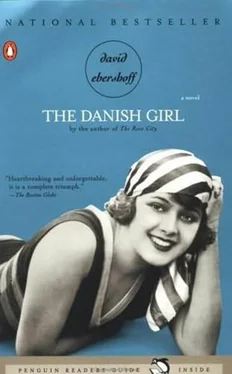
Greta couldn’t stand it. She would button up her smock and clip her hair back with the tortoiseshell comb and mix her paints in the Knabstrup bowls and stand in front of a half-finished portrait of Lili and fail to understand how to complete it. The painting-with Lili’s upper body complete and the lower half only a pencil outline-looked to Greta as if it were someone else’s work. She would stare at the canvas, the edges taut from the nails she hammered in herself, only to find it impossible to concentrate. Anything at all could disrupt her. There was a solicitation at the door for a subscription library. There was Edvard IV lapping sloppily in his water bowl. There was the open door to Einar’s studio, revealing his daybed tidy with the pink-and-red kilim laid across, and the neatness and emptiness of a room where no one lived anymore. A dresser with empty drawers; a wardrobe with nothing inside but a single hanger on the lead pipe. She felt a throb in her chest, and the only thing she could think of was Einar rattling across Europe in a railcar, arriving in Dresden, at night, an icy dew dampening the tips of his hair, the clinic’s address tight in his fist.
There was another exhibition of her paintings in Hans’s gallery, and for the first time she didn’t attend the opening. Something in her felt sick of it all, though she was careful not to repeat such a sentiment to Hans. How ungrateful it would sound. How petulant. Greta, who five years ago didn’t have a reputation and who just this morning sat for an interview with a handsome journalist from Nice with hooded eyes who would interrupt her and say, “When did you first know you were great?” Yes, all of that, and more, in five years; but even so Greta would sit back and think, Yes, I’ve done something with myself-but what did it matter? She was alone, and her husband and Lili were in Dresden, alone.
More than a week after Einar left for Dresden, on a day slick with rain and screechy with skidding motorcars, Greta had met Hans at his gallery. He was in his back office, and there was a clerk at a desk making entries into an account book. “They didn’t all sell,” Hans said of the paintings at the exhibition. One of Greta’s paintings-Lili in a cabana at the Bains du Pont-Solférino-was on the floor, leaning against the desk where the clerk was pushing his pencil against his lined paper. “I wish you had come to the opening,” Hans was saying. “Is something wrong?” And then, “Have you met my new assistant? This is Monsieur Le Gal.”
The clerk was narrow-faced, and there was something in his soft brown eyes that made Greta think of Einar. She thought of him-Einar cautiously boarding a tram in Dresden, his eyes lowered and his hands folded shyly in his lap-and shuddered. She thought to herself, although not in so many words, What have I done to my husband?
“Is there anything I can do?” Hans asked. He moved toward Greta. The clerk was keeping his eyeglasses and his pencil close to his task. And Hans came to Greta’s side. They did not touch, but Greta could feel him there, as she stared down at the painting: Lili’s smile stretched back from the pull of her tight bathing cap; Lili’s eyes, dark and alive-bottomless, they seemed. Greta felt something on her arm, but when she looked there was nothing, and Hans was now standing by the clerk’s desk, his hands in his pockets. Did he want to tell her something?
Carlisle had found them in their embrace, that afternoon with the freezing rain, when Hans’s neck was pink from the barber. She hadn’t heard the scratch of his key until it was too late, and there was an awkwardly long instant when both Greta and Carlisle froze-she with her head against Hans’s chest, Carlisle, a scarf around his throat, with his hand dangling back to the doorknob. “I didn’t know anyone was-” he began. She pulled away from Hans, who held up his hands and started to say, “It’s not what you’re thinking…” “I can come back,” Carlisle had said. “I’ll be back in a bit.” He was gone before Greta could say anything else.
Later that night, she had sat at the foot of his bed and rubbed his leg through the blankets, and said, “Sometimes I think Hans is my only friend.” And Carlisle, with his nightshirt split open at the collar, said, “I can understand that.” And then, “Greta. No one’s blaming you for any of this, if that’s what you’re thinking.”
Now, in Hans’s office, with the clerk busy with his pencil and his ruler, Greta said, “No word from Einar yet.”
“Are you worried?”
“I shouldn’t be, but I am.”
“Why didn’t you go with him?”
“He didn’t want me to.”
Hans stopped, and Greta saw his lips press together; was he feeling sorry for her? How she’d hate it if things had come to that.
“Not that it upset me,” she said. “Not that I don’t understand why he had to go alone.”
“Greta,” Hans said.
“Yes?”
“Why don’t you go see him?”
“He doesn’t want me there.”
“He was probably too embarrassed to ask for your help.”
“No, not Einar. He isn’t like that. And besides, why would he be embarrassed? After all this, why would he be embarrassed now?”
“Think about what he’s going through. This isn’t like anything before.”
“But then why wouldn’t he have let me go with him? He didn’t want me there. He was clear about that.”
“He was probably too afraid.”
She stopped. “Do you think?”
The clerk lit a cigarette, the match rough on the sandpaper strip along the box. Once again she wanted Hans to hold her, but she wouldn’t let herself move toward his arms. She straightened her back and ran her fingers down the pleats of her skirt. She knew it was old-fashioned, but Greta couldn’t bring herself to slip into his embrace while she was still Einar’s wife.
“You should go see him,” Hans said. “If you want, I’ll go with you. I’d be happy to go with you.”
“I can’t go.”
“Of course you can.”
“What about my work?”
“It can wait. Or even better, pack your easel. Take your paints with you.”
“Do you really think I should?”
“I’ll go with you,” he said again.
“No,” she said. “That wouldn’t be any good.”
“Why not?”
On the clerk’s desk was a copy of L’Echo de Paris , folded open to a review of her latest exhibition. She hadn’t read it yet, and there was a paragraph that leapt out at her as if underlined: “After so many pictures of the same subject-this strange girl called Lili-Greta Wegener has become tedious. I wish upon her a new model and a new color scheme. Coming from California, why hasn’t she ever turned her eye to the golds and blues of her native land? Paint me a picture of the Pacific and the arroyos!”
“If I go I’ll have to go by myself,” Greta said.
“Now you’re sounding like Einar.”
“I am like him,” she said.
They were silent for a few minutes, studying the painting and listening to the rain mix with the traffic. Paris was cold, each morning the wet seeping deep beneath her skin, and Greta imagined the only place damper and grayer was Dresden. Going there would be like slipping further into the cave of winter.
Again Hans said, “If there’s anything I can do…”
Once again he moved to her side, and then there was that sensation on Greta’s arm, like a feather on her skin. She could feel him there, through his herringbone suit-his soft pulse of heat. “Greta,” he said.
“I have to go.”
“Do you suppose it’s time-”
Читать дальше













